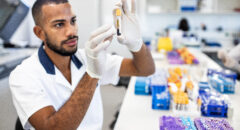 Completing treatment for acute myeloid leukemia (AML) can feel like a rollercoaster experience. For some people, treatment may have destroyed the leukemia cells and you may feel excited and relieved to have finished treatment, but at the same time, you might feel stressed worrying about whether the leukemia will come back or not. These emotions are quite common in people who have had cancer. It may take some time before your concerns calm down, but it may help to know that many leukemia survivors have adapted to living with this state of unpredictability and are living their full lives.
Completing treatment for acute myeloid leukemia (AML) can feel like a rollercoaster experience. For some people, treatment may have destroyed the leukemia cells and you may feel excited and relieved to have finished treatment, but at the same time, you might feel stressed worrying about whether the leukemia will come back or not. These emotions are quite common in people who have had cancer. It may take some time before your concerns calm down, but it may help to know that many leukemia survivors have adapted to living with this state of unpredictability and are living their full lives.
While leukemia can be closely monitored and treated, it may never go away completely. For people experiencing this, you may use a variety of therapies or get regular treatments with chemotherapy to help keep the leukemia under control and to relieve symptoms that develop from it. Living with leukemia that does not go away can be very stressful and can cause you to develop feelings of uncertainty. Whether or not the leukemia went away completely, it’s important to make sure you still complete necessary steps to manage your life after AML treatment.
Below are important this to consider during your journey.
Seeing a New Doctor
After your treatment, you may begin seeing a new doctor who is not familiar with your medical history. It’s important to gather the detailed information of your medical background soon after your treatment and provide your new doctor with the details of your diagnosis and treatment. Make sure to keep copies of this information for yourself. Obtaining these details right after treatment is typically easier than trying to get them at some point in the future.
Here is a list of what you will need to provide to your doctor:
- If you had surgery, a copy of your operative report(s)
- A copy of your pathology report(s) from any biopsies or surgeries
- Names and contact information of the doctors who treated your cancer
- If you stayed in the hospital, a copy of the discharge summary that the doctor wrote when you were sent home
- If you had radiation therapy, a copy of the treatment summary
- If you had chemotherapy or other medicines, a list of your drugs, drugs doses and when you took them
Follow-Up Care
Treatment for AML can take months or years to complete. After treatment ends, it’s vital to complete frequent follow-up exams. These exams allows the doctors to examine you, get blood tests done or complete bone marrow tests. These follow-up exams are also needed to check for cancer recurrence or side effects of treatments, as well as, give you the opportunity to voice any concerns you may have about your progress.
Cancer treatments can have side effects that can last for either a short or long period of time, so if you experience any side effects during or after treatment, talk with your doctor about any changes you notice. If all is well during your checkups, your appointments may be less frequent over time.
Life after AML treatment can be difficult and worrisome for some people. Scheduling constant follow-up appointments with your doctor can help make the journey after AML treatment less overwhelming and provide reassurance.








